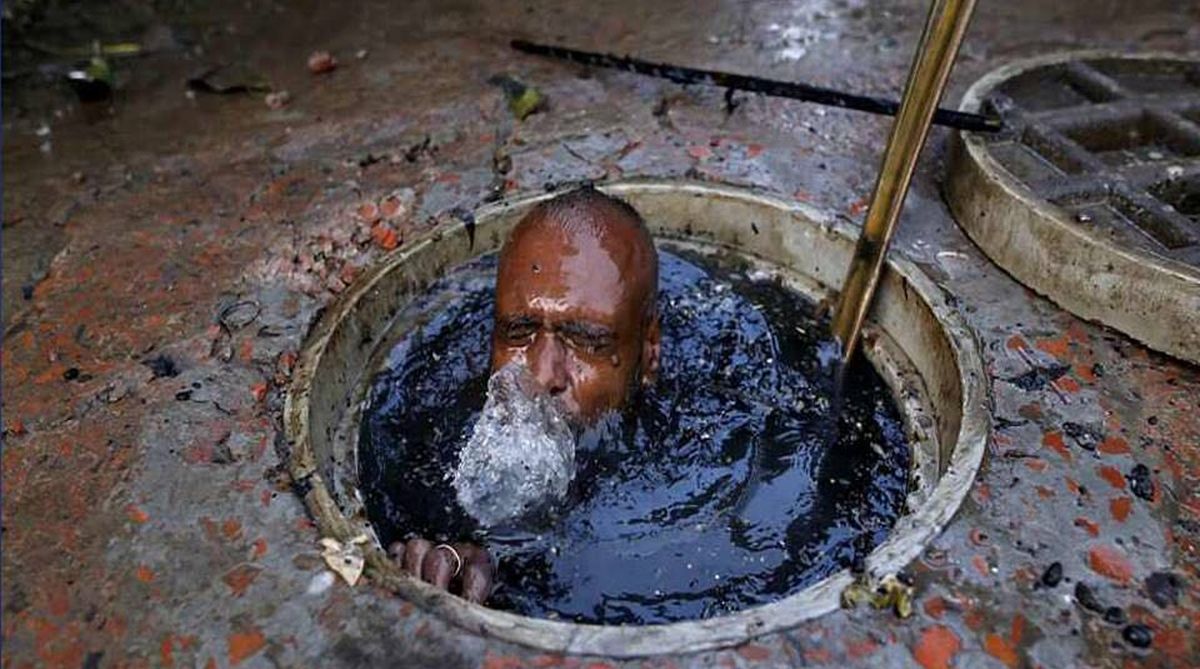Will social media end society as we know it?
For humans to exist as a society there must be harmony among people even when they disagree on most topics.…
The new machines allocated to replace the manual scavenging are proving to be inefficient. Despite the government and the Supreme Court having taken steps to curb it, the employment, engagement and exploitation of sanitation workers for manual scavenging, endangering their lives in the process, continues to be a rampant practice across the country.

representational image
In India, there have been numerous instances of human rights breaches. When it comes to the safety of sanitation workers, disregarding human rights has become the norm. Mitigating occupational health risks for sanitation workers remains a distant dream.
The Union Housing and Urban Affairs Ministry has signaled sanitation workers’ safety as part of Swachh Survekshan 2022 to prevent deaths due to the cleaning of sewers and septic tanks, but in vain. Urban sanitation workers are in a quandary and remain invisible. Recently, four sanitation workers died in Solapur, Maharashtra, while cleaning a manhole without proper safety gear. One of them fainted within the manhole, and when another co-worker went in to take him out, he also died after inhaling the toxic fumes. Two others who followed, hoping to help them get out, also met the same fate the next day in the hospital.
Advertisement
The Prohibition of Employment of Manual Scavengers and Rehabilitation Act (2013) bans manual scavenging in the country. It also mandates punishment for those found to have employed and engaged people in cleaning sewers and septic tanks. Furthermore, the Supreme Court in 2014 also ordered all states and union territories to pay a sum of Rs. 10 lakh to families of those who lost their lives while cleaning sewers and septic tanks. However, stories from the field paint an entirely different picture.
Advertisement
Six months ago, one sanitation worker suffered convulsions after he was exposed to a drainage hole in Pune. Since inhaling the toxic substance can cause pulmonary edema, he was sent to the hospital. He had to go back to work the next day. Solid waste streams, especially those that contain organic matter, can produce toxic hydrogen sulphide that can be fatal to anyone who is exposed to it.
Last year, three sanitation workers died of asphyxiation and inhaling poisonous gas after entering a sewer in Madhya Pradesh’s Singrauli district. Two of the workers who entered the tank to carry out repair work immediately fainted. Following this, the third worker was forced to go down into the tank to investigate, subsequently fainting in the process.
The three workers were rescued by the State Disaster Response Force and rushed to a hospital where they were declared dead. Workers who have spent over three decades told us a completely different story than the officials. Numerous workers who spoke to us said they could not afford even the basic equipment needed to work safely. Sanitation workers often echo a common sentiment when they say that efficient machines were discontinued despite requests that they be brought back.
The new machines allocated to replace the manual scavenging are proving to be inefficient. Despite the government and the Supreme Court having taken steps to curb it, the employment, engagement and exploitation of sanitation workers for manual scavenging, endangering their lives in the process, continues to be a rampant practice across the country. It was revealed by the Union Minister of State for Social Justice and Empowerment, Ramdas Athawale, in a reply to a question raised in the Lok Sabha that 376 sanitation workers died between 2014 and 2019, with 2019 having accounted for 110 of them, a 60 per cent increase as compared to the previous year.
Sanitary workers also face social challenges. Low-grade, unskilled sanitation workers encounter social stigma and discrimination. They are also linked to a caste-based structure and the work is often allocated to castes perceived to be lower in the hierarchy. This humiliation compounds the social ostracizing and limitations on social mobility that workers face and often results in intergenerational discrimination.
Various measures such as vaccinations, health insurance, and regular health checks, are part of the standards and guidelines for sanitation workers. However, those are rarely provided to them. The right to live with human dignity, the right against hazardous industries, the right to a decent environment, to health, etc., all guaranteed under Article 21 of the Constitution of India, therefore, remain an unfulfilled dream for many.
(The writer is from Symbiosis Institute of Media and Communication, Symbiosis International (Deemed University), Pune.)
Advertisement